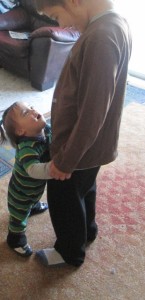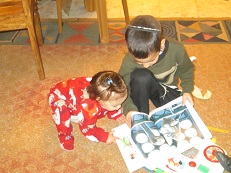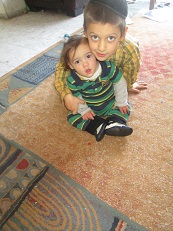 Yesterday, Yirmiyahu was playing on the floor with ds7 – ds7 was on his hands and knees in front of him, and Yirmiyahu pulled himself up by holding on to ds7. Nothing new about that, he does it all the time. What was different this time is that ds7 moved away, and Yirmiyahu stayed standing!
Yesterday, Yirmiyahu was playing on the floor with ds7 – ds7 was on his hands and knees in front of him, and Yirmiyahu pulled himself up by holding on to ds7. Nothing new about that, he does it all the time. What was different this time is that ds7 moved away, and Yirmiyahu stayed standing!
I was right next to them and said something intelligent like, “Oh, my gosh, Yirmi’s standing all by himself, look, look, look!” I expected him to fall right away but he stayed standing a surprisingly long time. Yirmiyahu was watching me watch him and his look clearly said, what’s the big deal? He’s been very stable for a long time when standing and usually holds on just barely to something in his vicinity, and he didn’t seem to be aware that this time was any different.
The kids were very excited – dd13 ran in from her room to see but he wasn’t standing by that point anymore. So then everyone wanted to get him to do it again, and they kept moving away when he was standing next to them. Of course he sat right back down. I told them to leave him be – we know he can do it and he’ll do it again when he’s ready, and to push him at this point will put him back rather than move him forward. I don’t want to intimidate him by asking him to perform and do something he’s not yet ready to do more of. He’s only going to repeat it when he feels secure and ready, and if we push too soon it’s going to negatively impact his feelings of security and readiness.
 After I told them this, it reminded me of something I read recently in Anat Baniel’s book, Kids Without Limits. I went back to look it up so I could quote it here for you. She said that “we want a child to feel and perceive differences and to focus on his own experience as it’s happening,” and when we ask a child to do repeat something he has just done for the first time, the demand “will often short-circuit the process in the brain of forming the new skill.” She goes on to explain that when a child does something for the first time, he usually didn’t do it intentionally; he knows what it felt like on the inside but not how to reproduce that, and what he needs is time to focus inward on what he did, not be asked to focus outward and repeat. She cautions parents that a new skill can seem to disappear when children are pressured to repeat their performance and often that inhibits the child and makes it much harder for him to do it again.
After I told them this, it reminded me of something I read recently in Anat Baniel’s book, Kids Without Limits. I went back to look it up so I could quote it here for you. She said that “we want a child to feel and perceive differences and to focus on his own experience as it’s happening,” and when we ask a child to do repeat something he has just done for the first time, the demand “will often short-circuit the process in the brain of forming the new skill.” She goes on to explain that when a child does something for the first time, he usually didn’t do it intentionally; he knows what it felt like on the inside but not how to reproduce that, and what he needs is time to focus inward on what he did, not be asked to focus outward and repeat. She cautions parents that a new skill can seem to disappear when children are pressured to repeat their performance and often that inhibits the child and makes it much harder for him to do it again.
 This is a common learning pattern of children (and maybe us adults, too!) of all ages. When they do something new, they often don’t feel the need to do it again and again right away. More commonly they build up to it bit by bit until they’re really comfortable with it. And then they do it all the time!
This is a common learning pattern of children (and maybe us adults, too!) of all ages. When they do something new, they often don’t feel the need to do it again and again right away. More commonly they build up to it bit by bit until they’re really comfortable with it. And then they do it all the time!
I had this situation – also yesterday – with ds11. He told me how much he loves reading and that he’d like me to help him get more ‘hard’ books. This enjoyment of reading hasn’t come quickly – as an auditory learner that’s no surprise – and though I’ve watched his ability and enjoyment of reading steadily growing, I chose not to point it out to him. I felt that bringing it to his attention would make him focus on his perceived lack of ability before he felt confident about his reading. Instead I kept my observations to myself, and that gave him the opportunity to really know inside him that he’s a strong reader without me saying a word.
This can seem counter-intuitive; there’s a tendency to think we can make something happen by focusing hard on it and repeating things again and again, or by constantly praising and complimenting our kids. Sometimes that helps. But often organic growth just isn’t like that – it can’t be forced, only encouraged.
Avivah
